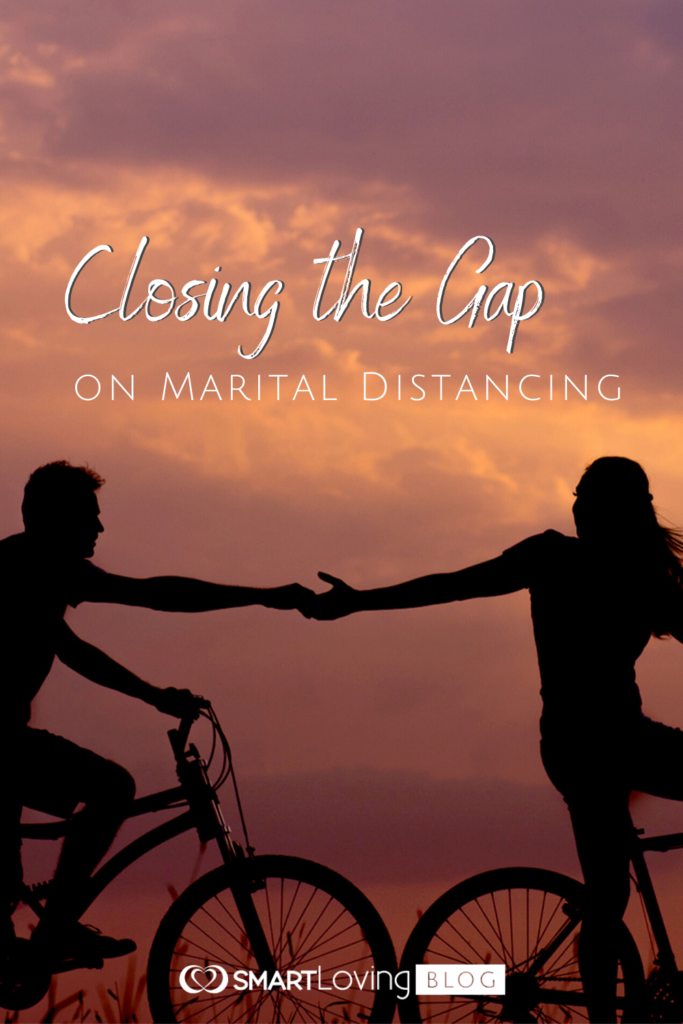Closing the Gap on Marital Distancing

There’s been quite a bit of talk around the increase in marital tension associated with the lock down conditions. Counselling services have rushed to set up online options and law enforcement reports an uptick in restraining orders.
What’s going on? This is not the time for a global marital crisis!
Normally, we’d say that one of the principle contributors to marriage stress is absenteeism. Long work hours, busy schedules, individual recreational pursuits all add up to less and less time together as a couple. Most marriages are on a starvation diet when it comes to couple time and it really takes a toll.
Why then, when we’re in lock down and spending so much more time together at home, are we not seeing improvements in our marital outcomes? We have a couple of theories...
Lockdown Upside
Firstly, not every marriage has taken a downward turn. We hear plenty of people saying how great this has been for their relationship, and in our case that is also true. While the workload for Byron has escalated, it’s now quite measured for Francine. We’re happily working from home with two ‘still at home kids’ doing our thing. We have a quick lunch together most days before getting back to work… and it’s nice – really nice.
Even though we’re not chilling out together doing couple things, it’s definitely better than the alternative that had Byron working long days at the office or on a plane while Francine was at her office. The occasional conversations while the kettle boils (our version of the office water cooler) are precious touch points in our day even though sporadic and brief.
And another big upside… we can pop a quick load of washing on, unpack the dishwasher, or bake a packet mix cake in the time it takes for that kettle to boil – little domestic milestones that liberate some of our ‘after work’ hours from household chores.
We’re getting daily walks too – usually together in the evening – due to the more regular schedules and non-existent dinner engagements. And our dog loves lockdown; she’s never had so much attention or exercise.
Couples like us who are doing ok don’t attract a lot of attention. It’s only when things get really intolerable that couples typically seek help. So, it could well be that there is a vast body of silent couples whose marital contentment is being drowned out by the noise coming from those marriages that are struggling.
We can’t really be sure if this is theory true, but one thing that might be a good indicator is whether we see a baby boom in 2021. Couples who are feeling more confident in their marriage tend to be more receptive to having another child. This might just be one economic stimulus no one expected!
Lockdown downside
It’s news to no one that there are many marriages that were already seriously struggling, but not quite on the point of melting down. Whether it’s the dynamics of the lockdown itself, or the external stresses many are now carrying, these times will add an enormous load to an already struggling relationship.
Of course, if our spouse is addicted, emotionally erratic, verbally or physically abusive or mentally unstable, more time together will probably make our struggling marriage harder, not easier. For couples in these fragile situations, being able to work outside the home can be a blessed relief and a vital life-line in a caustic homelife.
While we would normally advocate for more time together as a remedy for the normal range of marital ailments, in the case of serious dysfunction, it’s unhelpful and, in some cases, dangerous.
Couples in these situations can and should seek assistance and, if anything positive can come from this situation, then maybe the lockdown was the necessary nudge they needed to move towards the help that might turn things around.
Triggers of discontent
For all of us married couples, no matter what our relational starting point, one insight we’ve observed is that when one of us is really annoying the other – what psychologists call ‘triggering’ – the natural reaction is to put distance between us. The distance removes the trigger while our aroused emotions cool. (It brings a whole new dimension to the idea of social distancing!)
We all know how unpleasant it is to be in the vicinity of someone who is triggering us, even if its unintentional on their part. When we’re triggered, lots of energy goes into controlling our reaction. The emotional arousal is distracting and distressing; we tend to brood about what we’d like to say or, worse, get them back.
When this happens in the workplace, often it’s so exhausting we leave the job or apply for a transfer. And if that’s not possible, we just do our best to avoid the person and minimise interaction. It’s a natural thing to do, but it does not actually change anything.
Here’s the surprising insight: intentional bullying or abuse of power aside, when someone triggers us, it’s not really about them – it’s about us. If the same behaviour doesn’t trigger our colleague or friend, that’s a sure sign that its more our issue than theirs.
Avoiding the person doesn’t resolve our problem, it just removes the immediate trigger. The issue is still there – waiting for a new trigger to push itself back into our awareness.
Although it is counter-intuitive, whenever we find ourselves triggered, we need to see it as an invitation to dive in and address an internal issue – usually an emotional injury or frustration from our past. Blaming the other person for triggering us is unfair to them and unhelpful to our self-growth.
When we blame the trigger, we put our attention on the wrong issue and we deny ourselves the opportunity to mature our personality. We need to take responsibility for our emotional reactions, and unless we do, we allow our emotions to rule us, instead of us owning and directing our emotions.
Trigger Arguments
Consider this scenario from our interaction this week. Byron had been busy and distracted all day. In a brief moment of free airtime that evening, he asks Francine how her work went today. Francine jumps in to update him on a few projects that she has been working on with Byron’s input and advice along the way.
Within less than a minute, a text message pops up on Byron’s phone. He answers it quickly trying to avoid disrupting the conversation. It triggers an old wound in Francine of feeling unworthy of his attention. She crushes her irritation and continues with the update.
Though she is trying to be brief, it’s triggering Byron whose stress level doesn’t have a lot of capacity for extra information. It’s only a couple of minutes but seems to be taking a. very. long. time.
In another minute Byron wanders over to the kitchen to get some chips. As the packet noisily scrunches it triggers Francine again; that background noise is extremely irksome.
It seems to take for-ev–er! At which point, she loses it: “are you actually here or are you somewhere else”?
And just like that – we’re at a pivot point. If we take one direction it escalates and becomes a full–blown argument. We may or may not actually get to the real issue which is the deep wounds around our worthiness of the other’s attention and our fear of being smothered.
If we take the other direction (which we did), apologies are offered, tempers are cooled and the conversation resumes – without the chips and considerably briefer than it might have been.
Closing the gap
It’s a preferable outcome to the first option, but it’s still not ideal. We haven’t really explored together the deeper issues. We haven’t truly addressed the wounds that make us each reactive in different ways to the other’s clumsy attempts to connect.
Because at the end of the day, that’s usually what these ‘trigger’ arguments are about. We might think we are ‘arguing’ about the project briefing but we’re actually arguing about our underlying disconnection.
Both of us were seeking to connect but did a very poor job of it. Byron’s question about work was a bid for connection. He wasn’t really looking for a briefing – he was looking for a moment of acknowledgement of our coupleness. In a busy, industrious household, being a couple must still be actively cultivated.
Francine’s angry question to Byron was actually on point: he was physically present but not emotionally or intellectually engaged. She also was physically present, but emotionally indifferent to him and his stress.
Like all couples, after 30 plus years together, we are still learning how to do this marriage thing better. And being in our homes 24/7 is giving us 2-3 more ‘trigger opportunities’ per day than we would normally have.
“Oh great” we hear you groan, and we get it. But now flip it on its head: how do we choose to use this unexpected opportunity?
If you’re finding the lockdown with your spouse has bright spots as well as tense ones, you are not alone. Our advice: don’t run from the trigger arguments. Take a deep breath, shoot a quick prayer to God and face into them. There’s so much joy and intimacy waiting on the other side.



